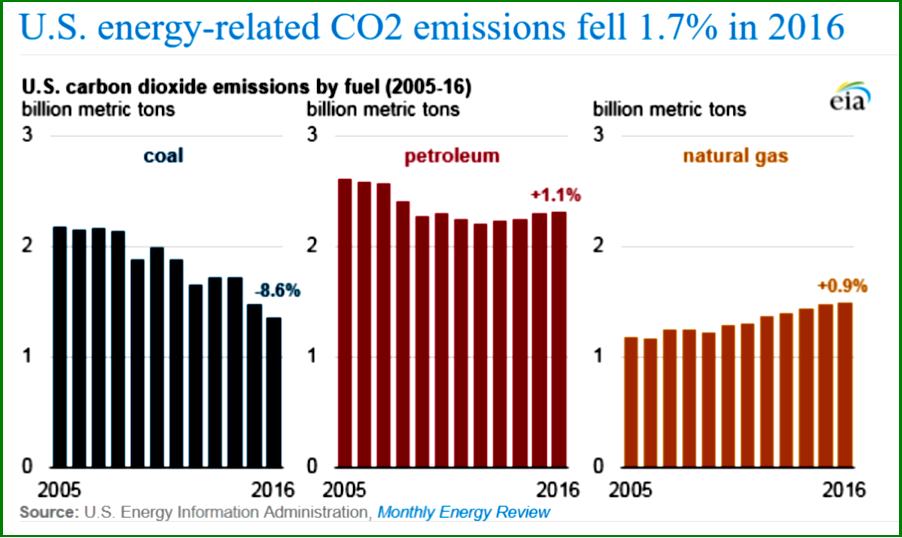
It will be interesting watching “states rights” Republicans try to ignore the record now that states are increasingly asserting the rights of their citizens to breathe clean air.
Ford, Honda, BMW of North America and Volkswagen Group of America have defied the Trump rollback of emission standards of light cars and trucks by cutting a deal with California on a voluntary framework to reduce emissions that is an alternative path forward for clean vehicle standards nationwide. Other troglodyte automakers will be under extreme pressure to follow what is a slight modification to the Obama Administration’s breakthrough CAFE regulations. (President Obama Unveils 54.5 MPG Fuel Economy Regulation for 2017-25. It will Alter Vehicle Choices and Increase Costs)
The deal supports continued annual reductions of vehicle greenhouse gas emissions through the 2026 model year, encourages innovation to accelerate the transition to electric vehicles, and provides industry the certainty needed to make investments and create jobs, claims the California Air Resources Board.
This important means that the auto companies party to the voluntary agreement will only sell cars in the United States that meet these standards. Industry observers note the deal comes as the Trump mis-administration is preparing to roll back federal vehicle emission standard – and effectively freezing them at the 2020 level through the 2026 model year. Critics say and the automakers agree that this move threatens air quality and health for millions of Americans, would increase costs to consumers, and would obstruct U.S. efforts to combat climate change. (US DOT and EPA Want to Slash Fuel Economy Standards. Trump Administration Proposal Has Many Critics)
“Few issues are more pressing than climate change, a global threat that endangers our lives and livelihoods. California, a coalition of states, and these automakers are leading the way on smart policies that make the air cleaner and safer for us all,” said California Governor Gavin Newsom. “I now call on the rest of the auto industry to join us, and for the Trump administration to adopt this pragmatic compromise instead of pursuing its regressive rule change. It’s the right thing for our economy, our people and our planet.”
The Trump decree faced growing opposition from a broad array of governors and mayors, auto companies, labor, consumer groups, public health organizations, and environmental groups. Earlier this month, a bipartisan coalition of 24 governors for more than half the U.S. population called for a stronger, national clean car standard.
In a letter last month, 17 worldwide automakers appealed to the White House and California to work together on a single national standard, warning of uncertainty for the auto market and noting that auto industry jobs are at stake. Now four of these companies have agreed to a framework that includes annual emission reductions and would speed the transition to electric vehicles. There likely soon will be others.
Clean Air Act Background
In 2010, the U.S. Environmental Protection Agency (EPA), National Highway Traffic Safety Administration (NHTSA), CARB, and car manufacturers established a unified national program harmonizing greenhouse gas emission standards and fuel efficiency (CAFE) standards, and in 2012 the agencies extended the national program to model years 2017-2025 vehicles. As part of the program, California and the federal agencies agreed to undertake a mid-term evaluation to determine if the greenhouse gas emission standards for model years 2022-2025 vehicles should be maintained or revised.
In January 2017, the EPA completed the mid-term evaluation by issuing a final determination, affirming that the existing standards were appropriate and would not be changed. The EPA arrived at this conclusion based on an extensive record it developed in conjunction with CARB. CARB confirmed in March 2017 that the agreed-upon standards for model years 2022-2025 were appropriate and feasible.
On April 13, 2018, however, the Trump Administration took the first step toward dismantling the national program when it issued a revised final determination that alleged the federal greenhouse gas standards for model year 2022-2025 vehicles were no longer appropriate.
The Trump Administration failed to provide any appropriate or relevant evidence for its arbitrary revision of its previous mid-term evaluation. Leading a coalition of 17 states and the District of Columbia, Governor Brown, Attorney General Becerra, and CARB sued the EPA on May 1, 2018 over the EPA’s April 13th action.


Pingback: 30 Senators Asking Automakers to Join California Fuel-Economy Agreement in Defiance of Trump’s EPA | AutoInformed